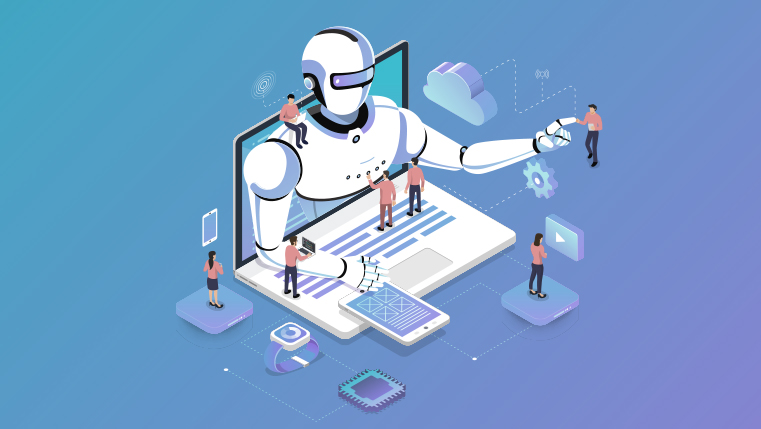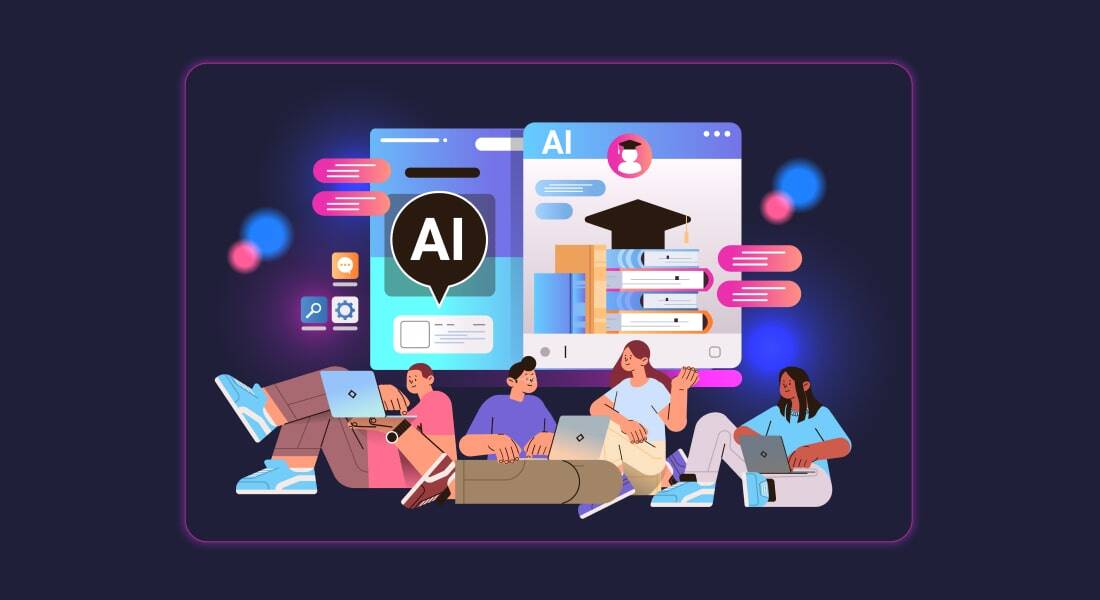5 Ways Artificial Intelligence Can Shape the Future of eLearning

Listen to the audio version
Artificial Intelligence (AI) is one of the hottest buzzwords in town right now. According to a research by markets and markets, the AI market will grow to a $190 billion industry by 2025. But the origin of AI dates back to the mid-1950s. The term AI was first coined by John McCarthy at the Dartmouth Conference.
The Oxford dictionary defines artificial intelligence as “The theory and development of computer systems able to perform tasks normally requiring human intelligence, such as visual perception, speech recognition, decision-making, and translation between languages.”
AI is a machine which possesses the ability to solve problems that can be solved only by the human brain. Remember the word suggestions that pop up as you text your friends on the messenger? Ever wondered how your mobile knows the likely words to be used? Well, all praises to the AI that is incorporated within our mobile devices. The AI engine studies our pattern of text and comes up with suggestions the next time we text someone.
The power of Artificial intelligence can be harnessed in eLearning too. The eLearning landscape can in fact grow by a drastic level by reaping the benefits of this emerging technology.
Five Ways AI Will Shape eLearning
1. Real-Time Questioning
“Artificial intelligence can act as a virtual tutor and answer questions on the fly,” reads an article by Forbes.
One of the major issues an individual comes across when learning is the inability to clear their doubts as soon as they pop up in their minds. At times it might just be the ‘fear of looking unintelligent’ (Forbes) or just that the trainer isn’t available. Or in case of looking up in the Internet, they would probably not want to disrupt their learning. But it is highly vital that learners ask quick /immediate questions, because if not, this will only complicate the learning process even more.
But by integrating AI into our eLearning courses, the necessity to walk up to the trainer or look up the Internet every time a slight confusion/doubt arises in the midst of learning can be avoided. All one would have to do is ask the AI engine and receive the appropriate answer. AI has the ability to learn “mountains of data” if trained properly, argue researchers.
2. Natural Language Processing
“Natural Language Processing, or NLP, is the sub-field of AI that is focused on enabling computers to understand and process human languages,” reads an article in Medium. Basically, it is all about talking to AI machines just like we talk to humans, all in the language we prefer! How many times have we wished we could talk to our instructors in our native language? Or communicate with the eLearning platform in the language we prefer? AI has indeed made our wishes true.
Once you integrate your eLearning courses with an AI assistant, you can ask queries and clarify your doubts in the language you prefer. This will not just make learning a lot easier but also save an ample amount of time and make learning even more engaging and efficient.
3. Improve Accessibility
Artificial Intelligence has also been used to improve the lives of people with disabilities. Let us take the example of Microsoft’s ‘Seeing AI’. This free app developed by Microsoft harnesses the power of AI to narrate the world to the blind. It can read text, recognize products, describe scenes, currencies, and describe the person standing in front of you, including the emotion on the person’s face!
AI can play a great role in training employees with disabilities too.
- AI can be used to convert ‘spoken language into captions and transcripts’ (Learning Solution Mag), thus helping the hearing-impaired comprehend the subject easily.
- AI-powered apps such as ‘Seeing AI’ can be incorporated in eLearning courses which will aid in offering learners’ descriptions of their environment and individuals at workplace or even onscreen. This will lead to an increase in collaboration and facilitate social learning.
- AI can act as a virtual assistant, who responds to voice commands, to individuals who deal with mobility issues. This will help them engage with the eLearning course and products in the workplace even better. “As these assistants “learn” more tasks, the ways they can increase access to eLearning and performance support—as well as provide performance support—will continue to increase,” reads the Learning Solutions Mag article.
4. Generate Fresh Content
Artificial Intelligence is also being experimented to create or generate new content. For example, the Sci-Fi short film ‘Sunspring’ was entirely scripted by an AI, including the title and an entire song! Well, this is a baby steps toward something that can come up in the coming few years.
AI is already being used to generate responses using existing online training resources. In the near future, AI can be used to generate the entire content of an eLearning course, taking away a huge load from the instructional designers.
5. Personalize Learning
Delivering the same form of content to every single learner is a very common approach in corporate training. It can indeed be quite overwhelming for a trainer to cater to and meet the needs of every learner. But this one-size-fits-all approach is definitely not appropriate as everybody has their own style and pace of learning.
AI can be used to track the previous performance of an individual and use that data to alter the current learning material, thus providing a personalized learning experience. Within an eLearning course, AI can track learners’ progress, which will help identify the areas where each learner lacks proficiency thus altering the material accordingly.
Artificial intelligence, when equipped the right way can do wonders in the eLearning landscape, but it definitely will take some time to take over the entire eLearning industry. It is just the beginning, and the future will uncover innovative and enthralling ways to make learning even richer.
AI is definitely stealing the show right now, but do you know the other trends fighting for the throne to rule the eLearning world right now? Download this free eBook to know all about them!




![Benefits of AI Chatbots in Learner Support [Infographic]](https://blog.commlabindia.com/hubfs/blogs/benefits-ai-chatbots-learner-support-info.jpg)
